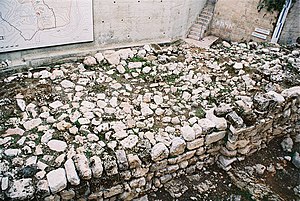Assyrian Siege of Jerusalem
| Siege of Jerusalem | |||||||
|---|---|---|---|---|---|---|---|
| Part of Sennacherib's campaign in Judah | |||||||
 Hezekiah's Wall |
|||||||
|
|||||||
| Belligerents | |||||||
|
|
|
||||||
| Commanders and leaders | |||||||
|
Sennacherib's Rabshakeh Sennacherib's Rabsaris Sennacherib's Tartan |
King Hizkiyahu of Judah Eliakim ben Hilkiyahu Yoah ben Asaf Shebna |
||||||
| Strength | |||||||
| Unknown | Unknown | ||||||
| Casualties and losses | |||||||
|
Unknown
|
Unknown | ||||||
Both sides claim victory
Unknown
Ancient Sources:
In approximately 701 BCE, Sennacherib, king of Assyria, attacked the fortified cities of Judah, laying siege on Jerusalem, but failed to capture it (it is the only city mentioned as being besieged on Sennacherib's Stele, of which the capture is not mentioned).
In 721 BCE, the Assyrian army captured the Israelite capital at Samaria and carried away the citizens of the northern kingdom into captivity. The virtual destruction of Israel left the southern kingdom, Judah, to fend for itself among warring Near Eastern kingdoms. At the time of Samaria's fall, there existed two kings in Judah — Ahaz and his son Hezekiah — who ruled as co-regents. After the fall of the Northern Kingdom, the kings of Judah tried to extend their influence and protection to those inhabitants who had not been exiled. They also sought to extend their authority northward into areas previously controlled by the Kingdom of Israel.The latter part of the reign of Ahaz, and most of that of Hezekiah were periods of stability during which Judah was able to consolidate both politically and economically. Although Judah was a vassal of Assyria during this time and paid an annual tribute to the powerful empire, it was the most important state between Assyria and Egypt.
In 715 BCE, following the death of Ahaz, Hezekiah became the sole regent of Judah and initiated widespread religious changes, including the breaking of religious idols. He re-captured Philistine-occupied lands in the Negev desert, formed alliances with Ashkelon and Egypt, and made a stand against Assyria by refusing to pay tribute. In response, Sennacherib attacked Judah, laying siege to Jerusalem.
Sources from both sides claimed victory, the Judahites (or Biblical author(s)) in the Tanakh, and Sennacherib in his prism. Sennacherib claimed the siege and capture of many Judaean cities, but only siege—not capture—of Jerusalem.
...
Wikipedia
